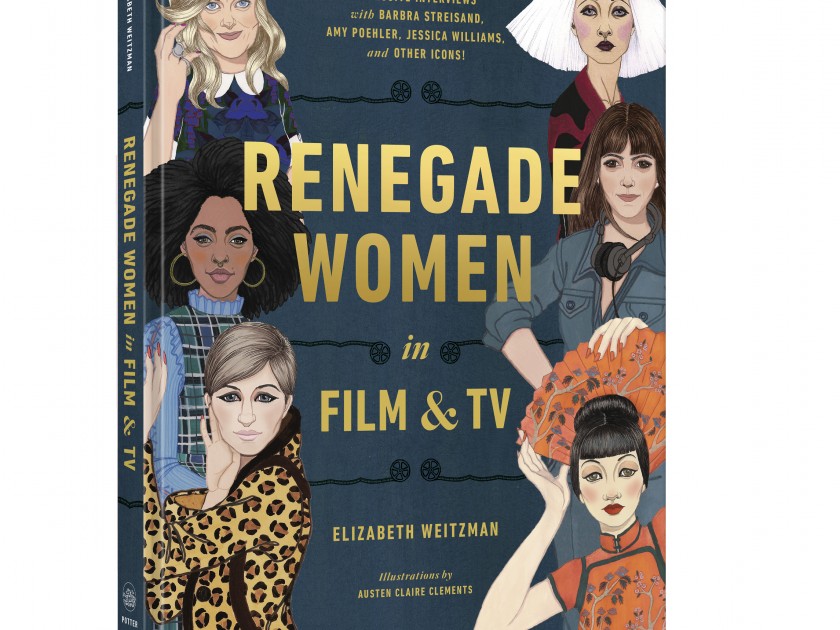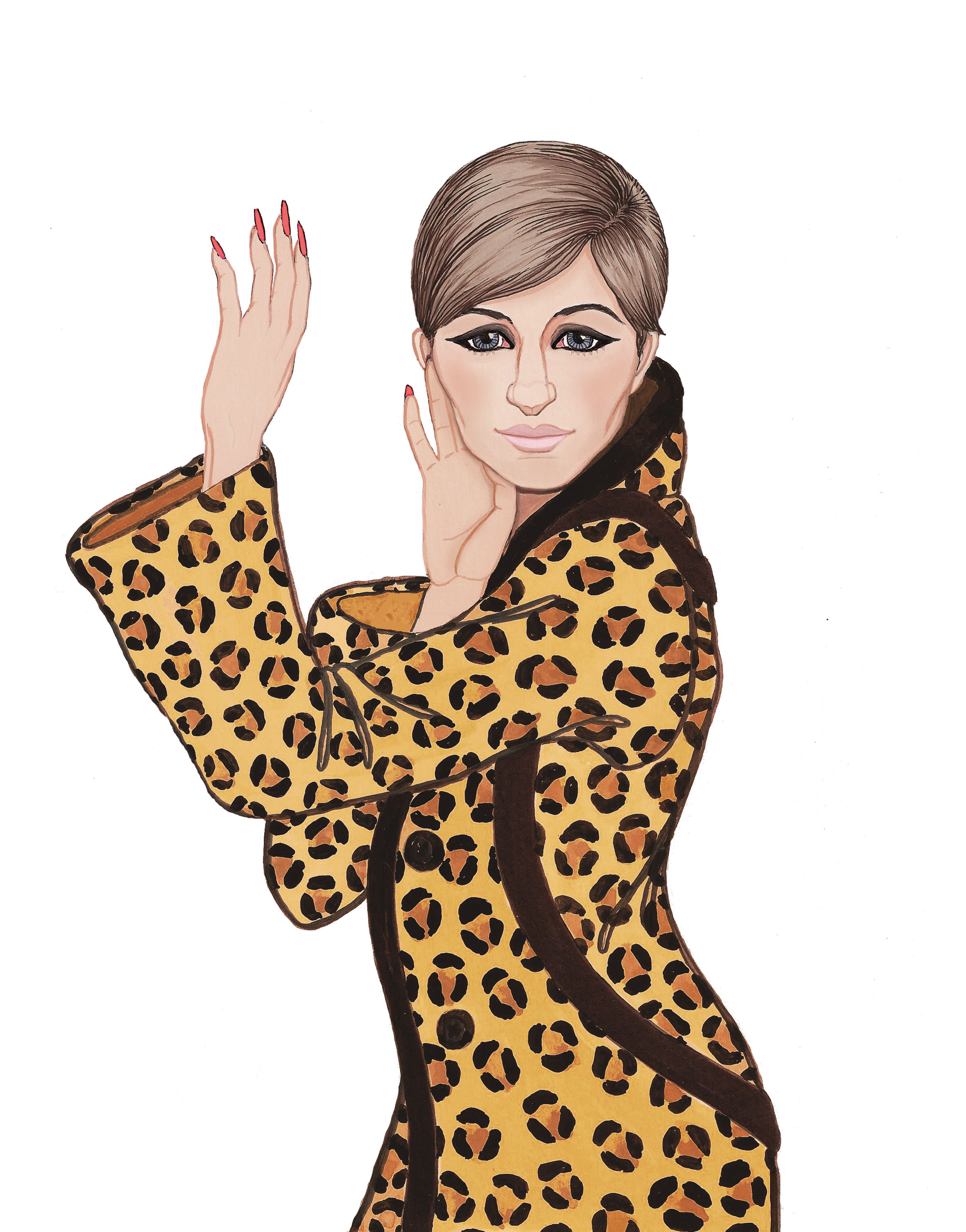

Photo courtesy of the author
BARBRA STREISAND
ACTOR | COMPOSER | DIRECTOR | PRODUCER | WRITER
2 OSCARS, 3 ADDITIONAL NOMINATIONS ; 4 EMMYS, 5 ADDITIONAL NOMINATIONS
B. 1942
“Hello, gorgeous.” In the very first line of her very first film, Barbra Streisand managed to convey an epochal span of confidence, yearning, self-doubt, and self-reliance. Seven months later, she used those same two words to accept the 1969 Best Actress Oscar for her indelible performance in Funny Girl.
She was twenty-six, and already an icon.
So how do we assess the impact of a legend? It isn’t only her once-in-a-lifetime talent that’s turned her into an eternal superstar. It’s also her ability, in song and performance, to capture and embrace the otherness that we feel, too. To reject uniformly entrenched standards with so much conviction and will as to single-handedly erase them.
Despite being typecast early on as “the kook,” “an odd duck,” and even “too Jewish”— among other actual descriptions — she insisted on defining herself, with all the complexity and beauty and brilliance that entailed.
Obviously, the stats are impressive. She became the world’s youngest EGOT winner in record time. She’s the only artist to have achieved a #1 album in every decade since her 1963 debut, The Barbra Streisand Album. And many of her musical triumphs have come from her equally wide-ranging films, including not just Funny Girl but What’s Up Doc?, The Way We Were, A Star Is Born, and The Main Event.
Of course, that’s not all: In 1983 she wrote, produced, directed, and starred in Yentl, becoming the first — and still only — woman to win a Best Director Golden Globe. She then went on to direct (and produce, and star in) The Prince of Tides and The Mirror Has Two Faces. Together, the three films received fourteen Oscar nominations.
But for a lifelong philanthropist, personal activism is just as essential as professional accolades. From the start Streisand has spoken to us and for us, through both art and example. We’re all bombarded, every day, by messages about who we should be. It was Barbra who proved that the truest power lies in embracing the way we are.
You were the Tony-nominated breakout star of your first play, at age nineteen. You won an Emmy for your first TV special, two Grammys for your first album, an Oscar for your first film. Have you always had a grand vision?
I guess so. When I was a kid, I didn’t want to do just one thing. I wanted to be the best singer, the best actress, the best recording star, the best Broadway star, and the best movie star. That was my challenge. My mother thought I should learn how to type. Starting with my first movie — actually my first Broadway show, I Can Get It for You Wholesale—I was already thinking like a director. I could see the whole story, envisioning how to stage scenes in my head.
You began pushing social boundaries early, too.
I am very interested in politics, the state of our country, and the search for justice. Up the Sandbox in 1972 was my first film for my own company, and I wanted to use it as a way to explore what was on my mind. The script tackled contemporary issues like the women’s liberation movement and a woman’s right to choose if and when to have a child.
And then in 1973 you earned an Oscar nomination for playing an outspoken activist in The Way We Were.
The Way We Were was very important to me, because it was more than just a love story. It dealt with political issues.
You executive produced A Star Is Born a few years later. What did that movie mean to you, both as an actor and a producer?
I saw it as a chance to reverse sexual stereotypes. This time, the woman’s not afraid to ask for what she wants. I was also interested in exploring something about the pressures of show business, what it’s like to be in the public eye. I put more of my own experience into that film than I had ever done before. It also forced me to write songs because we needed them.
But by that time you were already thinking about writing and directing your own movie.
You mean Yentl. It actually took me fifteen years to get that made. It’s about a woman who defied expectations, and I guess I did, too, by wanting to direct. On the night of the Golden Globes, when my name was announced as Best Director, I literally could not believe it. I was one of only four women directing films that year. Meanwhile, I won that award in 1984. And I’m appalled that I’m still the only woman to receive it.
Every true pioneer could have chosen a less challenging route. What gave you the confidence to make Yentl when so much was aligned against you?
Passion. I was standing up for something I’ve believed in all my life: gender equality. Women were being treated as if they were second-class citizens, as if they couldn’t cook and have babies and also study and run corporations. I wanted to empower women to be all that they could be. But I also felt the weight of responsibility as a woman director. If the movie was a flop, I was worried that other women would find it even harder to get their films made.
It certainly wasn’t easy to get yours made.
When I was trying to set up the project, the response was… less than enthusiastic. Here I was, according to various polls, a top box-office draw. And I felt like I was sixteen years old again auditioning for a Broadway show. Some executives seemed to have this antiquated notion of an actress as some sort of frivolous creature who couldn’t be fiscally responsible.
People may not realize the depth of the double standards you’ve faced.
The fact is, a man taking on multiple roles is considered multitalented. But a woman trying to do the same thing must be vain and egotistical. The attitude was, who does she think she is? Some men don’t want to be told what to do by a woman, and that’s probably why we don’t have a woman president today.
The sexist language that’s been used to describe you has often seemed unrelenting. Even the word “diva” is a double-edged sword.
Well, I’m not a diva. But I am strong. Strong men are seen as leaders. Strong women are seen as suspect. He’s assertive, she’s aggressive. He’s committed, she’s controlling. But every good director has a vision. Every artist wants control over their work. I want to be responsible for everything in my life, good or bad.
And yet when you perform, as a singer and an actress, you seem to tap into eternal truths instinctively rather than deliberately.
I trust my instinct. I know my truth and I use it. Truth transmits. Truth is the one thing that can touch people’s hearts and minds.
What’s one of the most gratifying changes you’ve seen over the course of your career?
Women are speaking out and telling their stories. They’re thinking of themselves more like a sisterhood, and recognizing common goals. And there is power in numbers. When we come together, we can make a difference.
You’re as busy as ever, but you haven’t helmed a movie since 1996. Do you think you’ll direct again?
As a matter of fact, I’m working on a new project. I can do a film only when I have a passionate attachment to the story, and this is a compelling story — but no buildings get blown up. I’m not sure even a classic like The Way We Were would be greenlit today. It’s a myth that if you’re well known or, as you call me, an icon, you can get what you want. But I’m still trying.
Learn more about Renegade Women in Film and TV and purchase it here.
Reprinted from Renegade Women in Film and TV. Copyright © 2019 by Elizabeth Weitzman. Illustrations by Austen Claire Clements. Published by Clarkson Potter/Publishers, an imprint of Penguin Random House LLC.
Elizabeth Weitzman is a journalist, film critic, and the author of more than two dozen books for children and young adults. She currently covers movies for The Wrap, and was a critic for the New York Daily News for 15 years. In 2015, she was named one of the top critics in New York by the Hollywood Reporter.